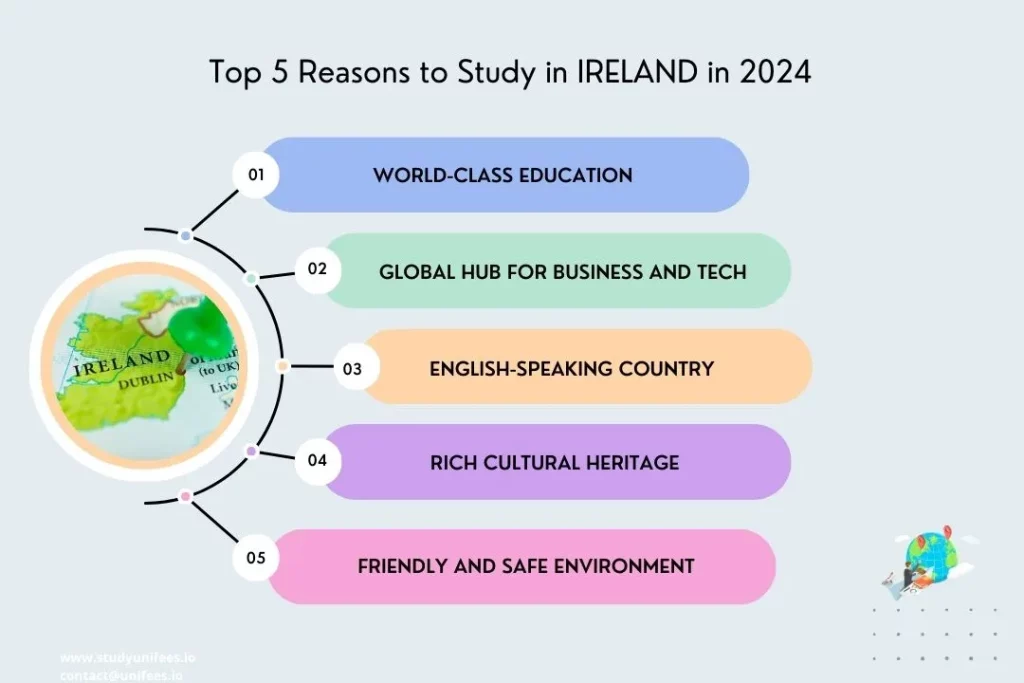Are you dreaming of a career in Data Science in Ireland as your educational destination? This blog is your essential guide! We will discuss what Ireland has to offer in the realm of Data Science education. From top universities and their acclaimed programs to detailed insights into course fees and other critical details, we’ve got it all covered. Join us as we explore and decode the vibrant world of Data Science education in Ireland, and discover how it can be the key to unlocking your dream career in this rapidly growing field.
Overview of Data Science in Ireland
Courses in Ireland, particularly in the realm of Data Science and Big Data Analytics, are designed to equip students with the skills needed to handle and interpret large and complex datasets. These courses in Ireland combine theoretical knowledge with practical application, ensuring graduates are industry-ready.

Top Universities Offering Bachelors in Data Science in Ireland with Fee and other details :
University College Dublin (UCD):
- Program: B.Sc. in Data and Computational Science (Full-time)
- Fees (approx.): €22,000 (INR 19.1 Lakh)
- Eligibility: Irish Leaving Certificate or equivalent with strong performance in Maths, Physics, and Computer Science.
- Other details: UCD’s program provides a solid foundation in computer science, mathematics, statistics, and data analysis, preparing graduates for data science careers or further study.
Trinity College Dublin:
- Programs: B.Sc. in Computer Science (with specializations in Artificial Intelligence or Data Science) (Full-time)
- Fees (approx.): €25,000 (INR 21.7 Lakh)
- Eligibility: Irish Leaving Certificate or equivalent with strong performance in Maths, Physics, and Computer Science.
- Other details: Trinity College Dublin’s program allows students to specialize in Artificial Intelligence or Data Science during their later years. This program is ideal for those seeking a strong computer science foundation with a focus on data science applications.
National University of Ireland, Galway (NUIG):
- Programs: B.Sc. in Computer Science (with electives in Data Science) (Full-time)
- Fees (approx.): €20,000 (INR 17.4 Lakh)
- Eligibility: Irish Leaving Certificate or equivalent with strong performance in Maths, Physics, and Computer Science.
- Other details: NUIG’s program allows students to choose data science electives, providing a strong computer science foundation with exposure to data science concepts.
University College Cork (UCC):
- Programs: B.Sc. in Computer Science (with specializations in Artificial Intelligence or Data Analytics) (Full-time)
- Fees (approx.): €22,000 (INR 19.1 Lakh)
- Eligibility: Irish Leaving Certificate or equivalent with strong performance in Maths, Physics, and Computer Science.
- Other details: UCC’s program offers specializations in Artificial Intelligence or Data Analytics, similar to Trinity College Dublin’s, providing a strong computer science foundation with a focus on a chosen data-related field.
Maynooth University:
- Program: B.Sc. in Multimedia, Mobile and Web Development (Arts) (Full-time) While not explicitly data science, this program offers strong data analysis skills
- Fees (approx.): €18,000 (INR 15.7 Lakh)
- Eligibility: Irish Leaving Certificate or equivalent with strong performance in Maths and Science.
- Other details: Maynooth University’s program incorporates data analysis skills alongside web development. This program is a good option for those interested in the intersection of data and user experience (UX) design.
Top Universities Offering Masters in Data Science in Ireland with Fee and other details:
University College Dublin (UCD):
- Programs: M.Sc. in Data Science (Full-time) * B.Sc. in Data and Computational Science (Full-time)
- Fees (approx.): €22,000 – €28,000 (INR 19.1 Lakh – INR 24.3 Lakh)
- Eligibility (Masters): A good Honours Bachelor’s Degree (2.1 or higher) in a relevant field (e.g., Computer Science, Mathematics, Statistics).
- Eligibility (Bachelors): Irish Leaving Certificate or equivalent with strong performance in Maths, Physics, and Computer Science.
- Other details: UCD offers both undergraduate and postgraduate programs in Data Science. Their programs are known for their strong foundation in theory and practical aspects, covering Machine Learning, Data Mining, Statistics, Big Data, and Data Visualization. UCD boasts a research focus and opportunities for real-world projects with industry partners.
Trinity College Dublin:
- Programs: MSc in Computer Science & Data Science (Full-time)
- Fees (approx.): €28,000 (INR 24.3 Lakh)
- Eligibility: Minimum Second Class Honours Grade I undergraduate degree in Computer Science or a related discipline.
- Other details: Trinity College Dublin’s program equips students to develop and apply data science techniques for solving real-world problems. It covers similar areas to UCD’s program and benefits from the college’s reputation for research and teaching.
National University of Ireland, Galway (NUIG):
- Programs: MSc in Data Science (Full-time)
- Fees (approx.): €22,000 (INR 19.1 Lakh)
- Eligibility: A good Honours Bachelor’s Degree (2.1 or higher) in a relevant discipline (e.g., Computer Science, Mathematics, Statistics).
- Other details: NUIG’s program provides the theoretical and practical skills needed for a data science career. It covers similar areas to other universities and emphasizes research with opportunities for cutting-edge data science projects.
University College Cork (UCC):
- Programs: MSc in Data Science & Analytics (Full-time)
- Fees (approx.): €24,000 (INR 21.0 Lakh)
- Eligibility: Minimum Second Class Honours Grade I undergraduate degree in a relevant discipline (e.g., Computer Science, Mathematics, Statistics).
- Other details: UCC’s program focuses on collecting, analyzing, and interpreting data. The curriculum covers similar areas to other universities and has a strong industry focus, providing opportunities for real-world projects with industry partners.
Maynooth University:
- Programs: MSc in Data Science & Analytics (Full-time)
- Fees (approx.): €23,000 (INR 20.1 Lakh)
- Eligibility: Minimum Second Class Honours Grade I undergraduate degree in a relevant discipline with a strong foundation in mathematics and statistics.
- Other details: Maynooth University’s program equips students to extract insights from data. It covers similar areas to other universities and has a research focus with opportunities for real-world data science projects with industry partners.
Technological Universities:
These merged institutions offer data science programs that may be more vocationally oriented:
- Technological University Dublin (TU Dublin)
- Munster Technological University (MTU)
- Athlone Institute of Technology (AIT)
- Letterkenny Institute of Technology (LYIT)
- South East Technological University (SETU) (formerly IT Carlow)
- Atlantic Technological University (ATU) (formerly LYIT)
Important Note: Fee figures are approximate and can vary depending on the program and student’s situation. Always check the official university website for the latest information on fees, eligibility criteria, and program details.
15 Reasons Why Ireland is Ideal for Data Science Studies
- Educational Excellence: Irish universities are known for their high academic standards, especially in STEM fields, making them ideal for data science studies.
- Cutting-edge Research: Many Irish universities are at the forefront of data science research, offering students the opportunity to engage with innovative projects and technologies.
- Industry Connections: Ireland’s tech industry hosts major players like Google, Facebook, and Apple, providing students with invaluable networking and internship opportunities.
- Cultural Diversity: Irish campuses are culturally diverse, offering a welcoming environment for international students.
- English Speaking: As an English-speaking country, Ireland is a favorable choice for students from various parts of the world.
- Quality of Life: Ireland is known for its friendly locals, beautiful landscapes, and a high standard of living.
- Robust Data Science Community: Ireland has a growing community of data scientists, evidenced by conferences, meetups, and seminars.
- Government Support: The Irish government actively supports the tech sector, including data science and AI initiatives.
- Scholarships and Funding: Many universities offer scholarships and funding opportunities specifically for STEM students.
- Alumni Networks: Strong alumni networks provide support and open doors for career opportunities.
- Innovative Curriculum: Universities offer curricula that are updated regularly to reflect the latest trends in data science.
- Flexible Learning Options: Many institutions provide flexible learning options, including part-time and online courses.
- Post-Study Work Opportunities: Ireland’s policies allow international students to stay and work post-graduation, a great opportunity for those looking to start their careers in Europe.
- Strategic Location: Ireland’s location makes it a gateway to both European and global markets.
- Quality Assurance: Higher education institutions in Ireland are subject to rigorous quality assurance procedures, ensuring a high standard of education.
Quality of Life in Ireland
- Living in Ireland: Ireland, known for its friendly locals and breathtaking landscapes, offers an exceptional quality of life. Students enjoy a safe, welcoming, and vibrant environment, which is conducive to both studying and leisure.
- Cost of Living: While cities like Dublin can be expensive, the overall standard of living balances the cost. There are various accommodation options available, including university dormitories, private apartments, and homestays.
- Cultural and Recreational Activities: Ireland’s rich cultural heritage offers students an opportunity to explore historic sites, engage in cultural festivals, and experience the famous Irish music and dance.

History of Indian Students in Ireland
- Indian students have a long history in Ireland, attracted by the high-quality education and post-study work opportunities. The number of Indian students in Ireland has been steadily increasing, with a significant percentage enrolling in STEM fields like data science.
- Irish universities have been proactive in welcoming Indian students, with many institutions having dedicated support services for international students. The presence of a substantial Indian community also means access to cultural events and networks, easing the transition for new students.
The Data Science Industry in Ireland
- Hub for Multinational Corporations: Companies like Google and Intel have significant operations in Ireland.
- Startup Ecosystem: A thriving environment for innovative tech startups.
- Government Initiatives: Programs and investments to support data science and AI development.
- Collaboration Between Academia and Industry: Universities often collaborate with industry leaders on research and development.
- Diverse Job Opportunities: Roles in various sectors like tech, finance, and pharmaceuticals.
- High Demand for Data Scientists: Growing demand for skilled professionals in data science.
- Focus on Future Technologies: Emphasis on emerging technologies like AI and machine learning.
- Professional Development Opportunities: Conferences and seminars for continual learning and networking.
In conclusion, Ireland offers an enticing mix of quality education, vibrant culture, and professional opportunities, making it an excellent choice for aspiring data scientists. With its strategic location, government support, and industry connections, Ireland is not just a place to study data science – it’s a place to start a global career in this exciting field.
To learn more or to schedule a consultation with a study abroad consultant for Ireland, please fill out the form below.










